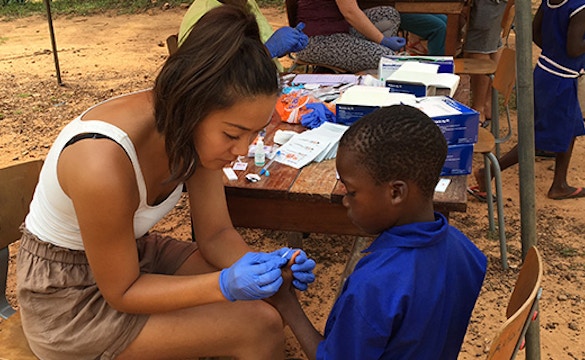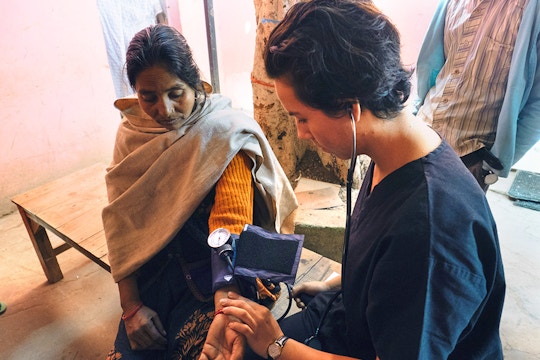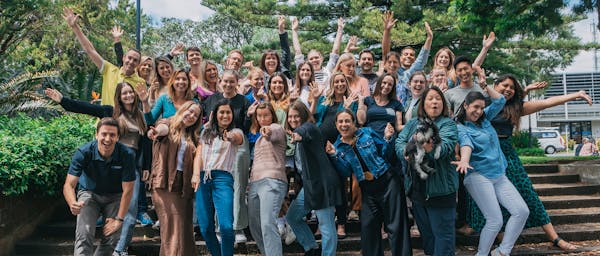You will be well supported on this programme, I would recommend!

Medical Elective Volunteer Project in Nepal
Purpose
Start dates
Duration
Volunteer hours
Age
Accommodation
Who is going?
Group video calls
Once you have secured your place, join regular video calls to meet your Program Manager and other volunteers before your trip.
This program is ideal for:
Volunteers who are at least a pre-medical or pre-nursing student. Local regulations prevent volunteers from treating patients without the supervision of local professionals so most volunteer work will be observational in nature.
Project details
Interested in Medical volunteering in Nepal? International Volunteer HQ’s Medical Elective enables volunteers to observe and assist in hospitals and clinics in locations across Nepal. Volunteers gain medical experience while seeing firsthand the challenges faced by a medical system in an under-resourced and developing country. Local staff benefit from the extra help as well as the cross-cultural exchange of learnings and ideas that international volunteers bring.
What to expect and how you'll make an impact
The contrast between medical practices in the western world and those in developing countries can be stark, and this is a real opportunity to understand and contribute to the realities of modern medicine in an under-resourced environment.
As a Medical Elective volunteer you will assist in hospitals in Kathmandu, Chitwan or Pokhara, shadowing and assisting local physicians and nurses. It’s possible for volunteers to get good exposure to a range of different medical departments, but as local regulations prevent volunteers from performing independent tasks, you should not expect to be carrying out hands-on medical duties. For this reason, this project is best suited to medical students.
Volunteers are able to:
- Observe operating rooms
- Assist with physical therapy
- Help with burns patients
- Take part in emergency room rounds
- Lead family planning sessions
- Give immunizations
- Help new mothers and babies
Experienced and longer term volunteers are more likely to be able to assist with hands-on tasks, and can also help with healthcare and outreach campaigns in rural health clinics.
Please keep in mind that there are two major festivals in Nepal and during these times there won’t be volunteer work available; but accommodation and all other services of the program will be available. The dates impacted are:
- 31st of October to 4th of November 2024 (Tihar Festival)
- 29th of September to 4th of October 2025 (Dashain Festival)
- 20th to 24th of October 2025 (Tihar Festival)
Why do Medical Elective volunteering in Nepal with IVHQ?
When you volunteer in healthcare in Nepal you’ll be adding value to the local community, while also developing personally and professionally by:
- Helping in local hospitals and clinics
- Learning about healthcare in a cross-cultural setting
- Observing a wide range of clinical practice
- Developing your communication skills
- Gaining medical experience
- Immersing yourself in Nepali culture
- Exploring Nepal’s amazing mountain ranges
Volunteer requirements
-
To join the Medical Elective project in Nepal volunteers need to be at least a pre-medical or pre-nursing student. CNAs, EMTs and paramedics may be eligible for this project too, as well as medical professionals; however, it is worth noting that this project is purely observational with minimal hands-on experience.
-
Volunteers need to be 18 years or over to participate in this program. If you are under the age of 18, IVHQ offers alternative volunteer opportunities for teens. Visit our High School Volunteer Abroad page to learn more.
-
All volunteers are required to speak fluent English, have adequate volunteer travel insurance and provide a criminal background check to IVHQ before departure.
Are you eligible to volunteer?
Submit a free application so we can confirm your eligibility and check availability for your preferred dates.
Not sure which program to join?
Get personalized recommendations >
Who is going?
Group video calls
Once you have secured your place, join regular video calls to meet your Program Manager and other volunteers before your trip.
Nepal photo gallery


























Medical specialties
Volunteers on the Medical Elective project may have the opportunity to work in the following departments/roles (with the relevant experience):
- Certified Nursing Assistant
- EMT
- General Medicine
- Maternity
- Medical Assistant
- Midwifery
- Paramedic
- Pediatrics
- Surgery
- Anaesthesiology
- Physician Assistant
- Dental Nurse
- Dentist
- Gynaecology
- Neonatal
Academic course credit

Academic course credit
Gain course credit from your college or university and meet your academic requirements when completing a volunteer abroad program with International Volunteer HQ!
Learn about course creditLocation

Location
Land-locked in the middle of South Asia, Nepal is known for its astonishing alpine scenery and breathtaking mountainscapes. But this diverse country offers much more than its remarkable natural environment. Among Nepal’s 28 million people, there are more than 100 different ethnic groups speaking as many languages and following a large number of religious and cultural traditions. It also faces the challenges associated with a history of civil war, natural disasters, political corruption and a lack of resources and infrastructure to support its population.
Volunteers can have a meaningful impact on Nepalese communities by providing assistance with a wide range of activities that help make life, and the future, better for local people. IVHQ has a number of volunteer projects in Nepal. Some are located on the outskirts of the capital city of Kathmandu in rural and urban areas, while others are in Chitwan 150 kilometres away, in the middle of Terrai - a flat fertile plain that borders India and stretches right across Southern Nepal. Pokhara is located in mid-western Nepal and is a popular tourist destination, renowned for its amazing mountain views.
Arrival and orientation
The program orientation begins on the first and third Monday of each month, and volunteers need to arrive in Kathmandu on the Sunday before orientation.
After you have registered for the program, please book your flights to arrive at Tribhuvan International Airport (KTM) in Kathmandu. Your airport pick-up is included in your Program Fee.
When you arrive, you will be greeted at the airport by a member of the local team and transported to the volunteer accommodation in Kathmandu. Your accommodation is covered by your Program Fee and includes the night before your program orientation.
If you are travelling in Nepal prior to your volunteer program, we can arrange for you to be picked up at a prearranged destination in Kathmandu on the day before your program orientation.
Orientation is hosted by our Nepal team in Kathmandu and runs over the course of two days. Orientation begins on the morning of your chosen start date and covers everything you need to know for your volunteer program in Nepal – an introduction to Nepal, Nepalese customs, language training details, rules and expectations, safety, travel opportunities in Nepal, and an introduction to your project and placement. The orientation will also give you a chance to visit local temples, sample authentic Nepali food, meet other volunteers and swap contact details for weekend travel and socialising.
If you are placed in Pokhara or Chitwan, you will travel to your placement location on Tuesday afternoon and you will begin work on Wednesday. If you are located in Kathmandu, you will begin work on Wednesday.
Volunteer schedule example
First Day:
On your first day of volunteering, you will be escorted to your placement by a local coordinator and introduced to the placement staff you will be working with.
Weekdays:
While a volunteer daily schedule will vary depending on the specific placement, a typical day is as follows:
| 7:30 AM | Breakfast at the homestay. |
| 8:00 AM | Volunteers leave home and travel to their placements. There is usually a tea break and a lunch break. |
| 2:00 - 5:00 PM | Work at the placement usually ends. Volunteers are free to travel back to the volunteer house, go sightseeing, or do some shopping. |
| 7:00 - 9:00 PM | Dinner at the homestay. |
Weekends:
During the weekends, volunteers have spare time and usually relax or take the opportunity to explore other parts of their local town and Nepal. Known for being home to the world’s tallest mountain, Mt Everest, Nepal is an adventurer’s paradise. It has a vast selection of exceptional hikes in the Himalayas with arresting views in every direction, white-water rafting, canyon swings, paragliding and scenic flights. It also has a rich multicultural heritage and a huge collection of temples, pagodas, shrines, carvings and ancient architecture, not to mention an astonishing array of wildlife and an interesting cuisine influenced by its many ethnic groups and cultures.
Accommodation and WiFi
On arrival in Nepal, volunteers stay in a local hotel in Kathmandu for their two-day orientation.
Volunteers are then accommodated together in homestays and hosted by local families who have been approved by our program staff. We give your host family a fee for your support, food and board. It is exciting to stay with a host family, providing you with a unique opportunity to learn about the Nepalese way of life, meet local people, try traditional food and speak the local language - especially when host families in Nepal tend to have limited English.
Living is basic but comfortable and most homestays have electricity and running water, with the exception of some rural homestays which are without these conveniences during the dry season. Western toilets can be found at your home stays but please keep in mind that Squat toilets are still the norm in parts of Nepal; so you might find these at your placement and during activities, treks, etc. Volunteers can also expect low-pressure showers that are generally not heated, however, this is refreshing after a day in the heat.
You can expect to share a room with one to three other volunteers and bedrooms have single beds and bunk beds with bedding provided. It is recommended volunteers bring their own sleeping bag and mosquito nets for any trips away.
WiFi is available in most of the volunteer homestays, however those based in Chitwan should expect to walk to a nearby cafe for internet access. If you would like to keep connected during your stay, we recommend bringing an unlocked mobile phone and purchasing a local SIM card when you arrive in Nepal.
Meals
The staple meal for most Nepali families is dal bhat, which consists of lentil soup (dal), rice (bhat) and vegetables in curry (tarkari) and/or meat (masu) with a side of pickle/sauce (achar).
Food in Nepal is heavily influenced by the country’s Indian and Tibetan neighbours and includes plenty of curries, breads and potato-based dishes. Volunteers are served two meals per day at their homestay and can purchase additional food to supplement this if they wish.
Bottled water is readily available in Nepal and volunteers should budget approximately £3 per week for two litres a day. If you have any special dietary requirements, please let us know when you apply for the program so we can make arrangements for you. However, we need to stress the point that you should not expect to eat as you normally do at home. We will do our best to see that you are well taken care of, but there is a need to be flexible.




























Pricing
Spots are limited. For a Registration Fee of just US$299 (approximately £234) you secure your spot and unlock all our preparation and training tools.
You don't need to worry about paying your Program Fee until you get closer to your start date.
Duration |
Program FeeDue 30 days before you start, or within 48 hours if you register inside of 30 days. Covers the cost of hosting you.
|
|---|---|
| 2 weeks | $535 Equivalent to $38/day |
| 3 weeks | $725 Equivalent to $35/day |
| 4 weeks | $915 Equivalent to $33/day |
| 5 weeks | $1,105 Equivalent to $32/day |
| 6 weeks | $1,295 Equivalent to $31/day |
| 8 weeks | $1,655 Equivalent to $30/day |
| 10 weeks | $2,015 Equivalent to $29/day |
| 12 weeks | $2,375 Equivalent to $28/day |
- All programs attract a Registration Fee of US$299 (approximately £234) in addition to the Program Fee. This covers all pre-departure support services.
- A 5% international banking fee is added at point of payment.
- Recommended spending money: Volunteers in Nepal generally find US$45 per week to be sufficient for expenses, such as lunches, transportation and local tours & activities.
- Daily breakfast and dinners
- Airport pick-up
- US$60 per week to cover the additional supervision and materials involved on the project
- Accommodation
- 24/7 in-country emergency support
- In-country program orientation
- Pre-departure support from your Program Manager
- Personalised preparation tools, guides and check lists
- Access to IVHQ’s preferred insurance and flights partners
- Comprehensive in-country day to day support and guidance
- Discounts on travel and tour add-ons
- Certificate of International Volunteer Service
Learn more about what's included in your IVHQ Registration Fee and Program Fee.
- Daily lunches
- Transport to and from your placement each day
- Return to the airport when your program finishes
- Flights
- Visa (if required), travel insurance (mandatory), vaccinations, criminal background check.
- Personal spending money for snacks, laundry, public transportation, drinks and leisure activities during your free time.
Popular add-ons & experiences in Nepal
Take your volunteer experience to the next level with these popular add-ons and experiences. Explore your options below and learn how to book them once you've been accepted onto the IVHQ Nepal program.
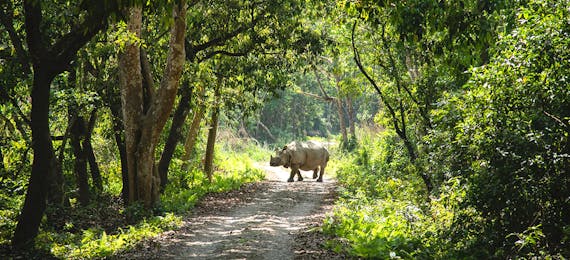
Embark on an unforgettable jungle safari to witness Nepal’s captivating wildlife in its natural habitat.
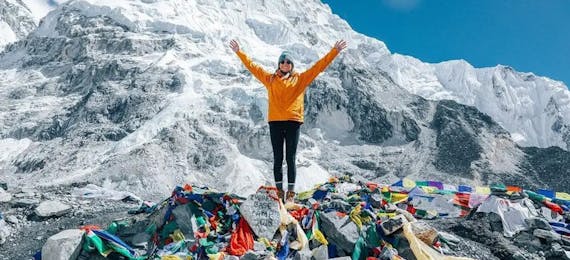
This iconic expedition is the most popular trekking route in the Himalayas and is unlike any other in the world.
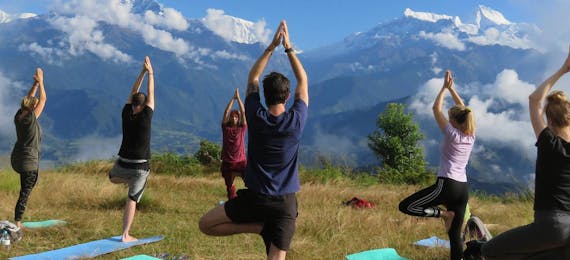
Reconnect with tranquility and mindfulness during a rejuvenating one-week yoga and meditation retreat, leaving behind the hustle and bustle of the Western world.
Check what's required to visit Nepal
Safety and support
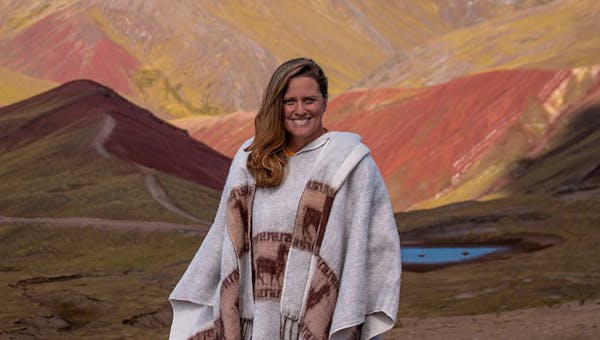
Safety and support
IVHQ follows best practice and industry-leading health and safety procedures, which are regularly reviewed and optimized as part of the B Corporation recertification.
- All volunteers encouraged to complete our interactive pre-departure training.
- All local teams trained on best practice volunteer management & First Aid.
- All IVHQ programs are required to adhere to IVHQ's Risk Management Policy.
- All volunteers have access to 24/7 in-country support from our local team.
Essential country information
Essential country information
| Capital | Kathmandu |
| Population | 28 million |
| Languages | Nepali |
| Currency | Rupee (NRs.) |
| Time zone | UTC+05:45 |
Weather and climate: The climate in Nepal varies largely due to the variations in geography across the country. Spring and autumn are the most pleasant seasons with dry weather and moderate temperatures. The Kathmandu Valley and other areas of high altitude experience summer temperatures of up to 28°C (82.4°F) and in winter, temperatures range between 2°C (35.6°F) and 20°C (68°F). The summer temperatures in Chitwan can reach up to 35°C (95°F) and in winter they range between 7°C (44.6°F) and a mild 23°C (73.4°F). The climate in Pokhara is similar to that of the Kathmandu Valley, with slightly warmer temperatures.
What recent volunteers said about their IVHQ experience
I have gained both cultural and medical experience and I regret not staying for a longer period because the learning opportunities were everywhere.
Just do it and you won’t regret it. It was really a fruitful experience for me. The people there were really nice and I enjoyed the medical elective in the local hospital. I look forward to joining these activities in the future again!
Through my participation in the IVHQ medical elective project, I gained invaluable insights and skills that have significantly enriched my understanding of healthcare and global medicine. One of the most significant gains was the firsthand exposure to diverse medical practices and patient care in a different cultural setting. This experience broadened my perspective on healthcare delivery and deepened my appreciation for cultural competency in medicine.
Moreover, working alongside experienced healthcare professionals in resource-limited settings taught me resilience, adaptability, and the importance of teamwork in overcoming challenges. I also developed strong communication skills through interacting with patients from various backgrounds, enhancing my ability to provide compassionate care and navigate language barriers.
For those hesitant about joining this program, I would offer the following advice: Embrace the opportunity for personal and professional growth that comes with stepping out of your comfort zone. While it's natural to feel apprehensive about working in unfamiliar environments, remember that every challenge presents a chance to learn and develop resilience. Approach the experience with an open mind, a willingness to learn, and a commitment to making a positive impact. By immersing yourself in this program, you'll not only contribute to meaningful healthcare initiatives but also gain invaluable skills and insights that will shape your future career in medicine.
To read all reviews, visit our reviews page.
